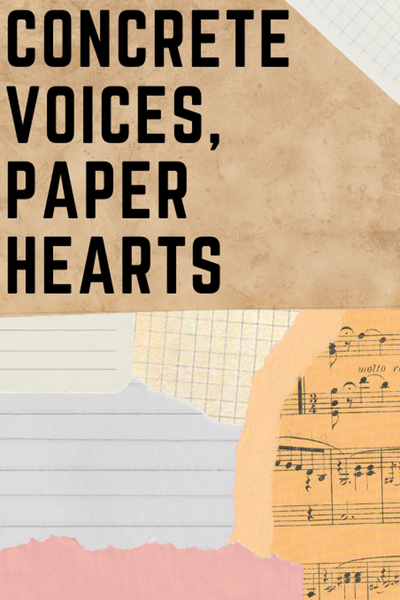The car pulls into the driveway and comes to a slow stop. The engine turns off with a low rumble. Peyton slumps against the steering wheel, laying his hands over his head.
“I’m sorry,” Peyton mumbles. “I’m sorry about doubting you and yelling at you at the ramen bar. It’s just…Gramp’s death was really hard. It felt like I was always trying to keep my head above water, and Grandpa was my lifebuoy. So I didn’t want to believe that he had any secrets or could have done anything wrong.”
“...At least his worst crime was being in love. There are worse secrets to have.” I say softly.
“I don’t think I could have stood up to my dad like that if you hadn’t been there,” Peyton says, smiling but teary-eyed.
“Thank you for standing up for me,” I say shyly, looking away.
We get out of the car and go inside. We both collapse onto whatever furniture is nearest. I take the couch while Peyton falls back into the recliner. The sun is setting outside the window, the street cast in gentle hues of yellow and pink.
“I just wonder if he ever went through with it,” Peyton sighs, staring dizzily up at the ceiling. “If he ever did more than write letters-if, he ever even confessed to her.”
“There is a way to find out,” I say, my eyes staring off through the ceiling and up into Felix’s room. Peyton reaches out and touches my hand, the skin turning electric. He’s looking at me in a way I’ve never seen before, and it terrifies me as much as it excites me.
“Sam left some chicken noodle soup, and it’s a cold night,” Peyton explains shyly. “We could share some-maybe watch a movie?”
I pull my hand away even though some part of me is begging to let it stay.
“I should…read the rest of the letters. It’s the only way to know what really happened.” I say distractedly.
“Oh,” Peyton says. “Um, yeah. I can bring some up to you later if you get hungry.”
I stand and walk up the stairs to Felix’s room. The archaeologist inside me reawakens, examining every word as if it were some foreign hieroglyphic, trying to analyze the meaning of each pen stroke. Most of the entries are domestic tales about the three friends spending time together (accompanied by Felix’s longing for Margaret ). But the further down the timeline I read, the more things start to change.
I find one from 1981, after his marriage to Peyton’s grandmother,
“My dearest Marget. Dearest? Dearest friend, surely. The summers we spent together will never fade from my memory. But my dearest, I doubt you will ever be. I could never be all of the things Richie is. It was no surprise when you chose him. And how pathetic am I to still write these letters, destined to be unread? I don’t even know who exactly I’m writing to anymore. It’s like I am writing to the idea of you, the phantom of what you were, of what I wanted you to be. But sometimes I am writing to myself, reflecting, as if in a diary. How shameful that the only way I can talk to myself is through you,”
I find myself getting lost in his world, diving into Felix’s mind. Sometimes Felix’s descriptions become so vivid that I feel as if I am living them. I feel as if I am in the yellow jeep alongside Margot and Richie, basking in a 1970s summer.
The rest of the night, I surround myself with the letters. There’s only one left by the time my body begins to give out. My eyes are unable to read, and my brain unable to process any of the words if I do. But I begin to weave together a narrative.
Felix, Richie, and Marget had been an inseparable trio. They were a group, never one without the other two. And all while, Felix believed that one day he would get the strength to tell Marget how he felt. But he was held back by the thought of inferiority; that he could never be hers, that he could never be Richie. And so Richie married Marget.
I try to muster up my strength and open the last letter. But the words blur together into an inky, melting mess. Like an old television turning off, my vision constricts into a pinprick, and then nothing at all. My body collapses from exhaustion, laid out on the wooden floor.
My eyes seal shut, and my limbs refuse to move when I command them to. I hear the door creak open, and someone walks to my side. I feel two arms wrap around me, lifting me up from the floor and up onto the bed. The covers roll over my cold skin up to my neck.
But I don’t smell death or artificial flowers. I smell Peyton. That familiar scent of pine and rosemary. Everyone has a scent, some stronger than others. But his has always been particularly identifiable. Pine and rosemary. What a delightful smell the two scents create.
. . .
I’m not sure if I’m awake or dreaming. I hear the rumble of a car engine. I peek open one eye and am greeted by the same blackness as before. At the end of the bed are two bright, glaring headlights. The mustard yellow jeep from the photo is sitting at the foot of the bed, rumbling. I roll onto my back and stare at it, not with fear but curiosity.
The car door pops open, and letters begin to flood out of it onto the floor. Like water, they begin to fill the room with a paper hiss. And still, I am unafraid. I stand on top of the bed, bouncing on my heels as if on the highboard. I dive off the bed into the sea of letters, holding my breath. I swim through the ancient yellowed pages and torn stamps. Fish made of Felix’s words, shaped by his words, swim around me.
I swim further and further down, not needing to take a single breath. Finally, I reach the bottom, a sandy cove filled with coral. And half-buried in the sand is Felix. Not as I remember him, not as Peyton’s grandfather or as a decaying corpse, but as a young man cast in stone.
And then I realize that this is a dream. But I don’t try to change it, to shape the dream into anything else but this. I don’t try waking myself up or returning to a dark, empty slumber. I simply let myself drift to the bottom of the cove next to Felix, studying the naive expression on his face. And I sink deep into the sand with him.











Comments (0)
See all